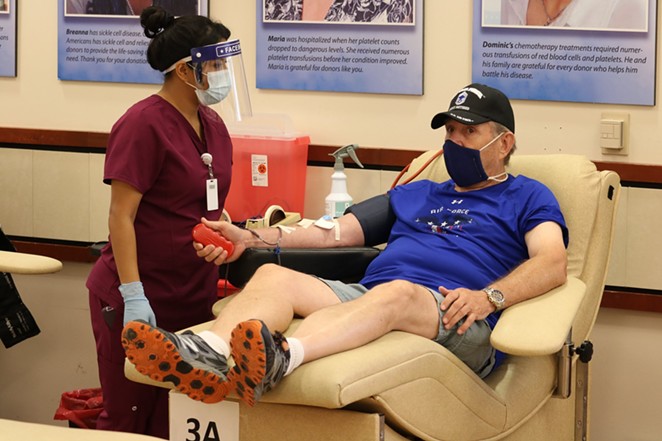South Texas blood shortage grows as pandemic cancels school donation drives


- Facebook / South Texas Blood & Tissue Center – Donor Pavilion
- A donor gives blood at a South Texas Blood and Tissue Center site.
When students return to campus in the fall, blood banks normally count on a donation boom thanks to school-sponsored drives.
This year, things are different. The pandemic-forced cancellation of campus drives has sent South Texas’ blood supply plummeting.
San Antonio-based South Texas Blood and Tissue Center, which supplies blood to hospitals in 40 counties, estimates the pandemic will prevent it from collecting 8,500 donations this fall. During a normal year, school-related drives provide up to a quarter of all donations for the center.
“I think the biggest impact has been with the cancelling of blood drives, particularly at workplaces, churches and schools,” Dr. Samantha Gomez, STBTC’s associate medical director, told the Current.
STBTC requires 500 donations daily to meet hospitals’ demands, but October’s daily average has slipped below 300 donations. Due to the dwindling supply, the center is only able to fulfill half of the type O blood requested by hospitals, according to Gomez.
The South Texas blood supply has been inadequate since the onset of the pandemic. And while blood shortages aren’t uncommon, the ongoing situation could cause a secondary public health emergency, STBTC officials warn. Without a significant increase in blood donations, hospitals are forced to make difficult decisions about who they can treat with the limited resources.
Cancelations cause concern
In a typical year, 70% of blood donations in South Texas come from community drives, and STBTC began seeing a steep decline in those events at the onset of the pandemic.
Amid new work-from-home policies and shutdowns, hundreds of community blood drives were cancelled across South Texas this summer. That cost the center an estimated 7,500 donations.
“It is really nice when you are at work, you just go down the elevator, or down the stairs and you can donate,” Gomez said. “And now you are having to drive to one of our locations across town. That has had an impact on how much blood we are collecting.”
The impact of the summer deficit is being compounded by the autumn cancellations. Fewer than half the usual school drives are going on through the remainder of the year.
Trinity University Volunteer Action Community (TUVAC), a campus organization that connects students to community service programs, typically hosts a drive each semester. Executive Coordinator Elsie Duran said she could normally count on them to fill up with donors.
But this year is complicated.
“The Trinity administration’s priority is to keep students safe and avoid the spread of COVID-19,” Duran said. That’s meant pausing campus visits from outside organizations, including blood banks.
Low supply, high demand
Blood donations are required for treatment of medical conditions including anemia, cancer and blood disorders. They’re also needed for transfusions during surgeries and to replace blood lost during childbirth.
COVID-19 has also added to the demand, experts say. Patients being treated for the virus may receive transfusions with convalescent plasma. What’s more, some patients may have delayed treatments during the early part of the pandemic and now require blood.
“Once things started opening up, I think there were people who weren’t going to the hospital and weren’t seeing their physician as frequently as they should have been. And with COVID they didn’t want to go outside of their house,” Gomez said. “As their condition worsened, when things finally did open up, they got to the point that they had to go back to the hospital or to their physician to get transfused.”
If the shortage continues, hospitals could need to make critical decisions about which patients they can treat, Gomez warned. They may be forced to postpone or cancel surgeries. In the worst-case scenario, medical and trauma patients may be transported to other facilities so doctors can preserve blood for patients currently under treatment.
To make up for the lack of campus drives, STBTC is hosting its own fall drives. Donors can call (210) 731-5590, or visit SouthTexasBlood.org to make an appointment.
Stay on top of San Antonio news and views. Sign up for our Weekly Headlines Newsletter.
















